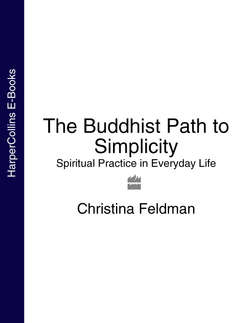Читать книгу The Buddhist Path to Simplicity: Spiritual Practice in Everyday Life - Christina Feldman, Christina Feldman - Страница 18
Moment-to-Moment Renunciation
ОглавлениеLetting go is a present moment practice. We learn to sit down and let go. We love deeply and let go. We embrace wholeheartedly the laughter and joy of our lives and let go. We meet the challenging, disturbing, and unpleasant, and let go. We are always beginners in the practice of renunciation. Each moment we begin we are following the pathways of freedom rather than the pathways of sorrow.
Studying life, we see the truth of the process of change from which nothing is exempt. Understanding this deeply we live in accord with its truth, and we live peacefully and simply. We liberate the world, other people, and ourselves to unfold and change according to our own rhythms, withdrawing our personal agendas rooted in craving and aversion. Letting go, we liberate ourselves from the burden of unfulfilled or frustrated desire. We learn to rest in ourselves and in each moment. Reflecting on impermanence, we begin to appreciate deeply the futility and unnecessary sorrow of being lost in craving or resistance.
Renunciation comes effortlessly to us in times of calm and ease. Nothing stops; sounds, sights, thoughts, and feelings all continue to arise and pass—seen and appreciated wholeheartedly. Yet none of them gains a foothold in our minds and hearts, our inner balance and well-being is undisturbed; there is a natural letting go. There are times in our lives when calm and balance seem to be a distant dream as we find ourselves lost in turmoil, struggle, or distress. In those moments we remember the freedom of being able to let go, yet the intensity of our struggle overwhelms us. In those moments, the first step towards peace is to recognize that we are lost. In those moments, it is not more thinking, analyzing, or struggle that is required; instead we are invited to look for simplicity. In these moments of complexity, letting go requires investigation, effort, and dedication—recognizing the sorrow of being entangled.
The Buddha spoke of wise avoidance, a word that may carry for us associations of denial or suppression. There is a difference between wise avoidance and suppression. Suppression is the unwillingness to see; wise avoidance is the willingness to see but the unwillingness to engage in pathways of suffering. In moments of intense struggle, renunciation happens in a different way; by learning to step out of the arena of contractedness. We turn our attention to the fostering of calm and balance. Bringing our attention into our body, to listening, to touching, to breathing, we learn to loosen the grip of struggle and confusion. Recovering a consciousness of expansiveness and balance, the understanding of the nature of our struggle comes more easily to us and we may discover we can let go.
It is easy to let go when there is nothing that we particularly crave or resist. Yet it is in the midst of our deepest obsessions and resistances that renunciation holds the power to transform our heart and world. Our capacity to let go is often clouded by ambivalence and reluctance. We know we suffer through overeating, but the second plate of food really does taste so good. We know that our anger towards another person makes us suffer, but if we were to let it go they may get away with the suffering they inflicted. We know that fantasy is a poor substitute for happiness, but its flavor is pleasurable. We know we may suffer through exaggerated ambition, but the feeling of pride when we attain our goals justifies the pain. Pleasure and happiness are too often equated with being the same; in reality they are very different. Pleasure comes. It also goes. It is the flavor and content of many of the impressions we encounter in our lives. Happiness has not so much to do with the content or impressions of our experiences; but with our capacity to find balance and peace amid the myriad impressions of our lives. Treasuring happiness and freedom, we learn to live our lives with openness and serenity. Not enslaved to the pleasant sensation, we no longer fear the unpleasant. We love, laugh, and delight, and hold onto nothing.
The appetite of craving arises from the pain of disconnection. The pain of believing ourselves to be incomplete or inadequate compels us to seek from the world all that we feel unable to offer ourselves. This pain of disconnection is not always acute; at times we describe it as boredom, forgetting that boredom is never a description of reality but a description of a state of mind superimposed upon reality. Boredom is often a surrender of sensitivity, clouding our capacity to see, listen to, and touch each moment as if we have never encountered it before. The antidote to boredom is not more sounds, sensations, and experiences, but recovering our capacity to see anew in each moment. The world we think we know, the people we think we know, the sounds and experiences we have encountered countless times before, come alive to us in new ways each moment we give them our wholehearted attention. Our storehouse of images, associations, history, and concepts is burned down in the light of compassionate, full attention.
Renunciation is not the territory of saints or ascetics but the territory of each one of us who treasures freedom. Each moment we let go, we embody freedom and follow the pathway of happiness. It is a present moment practice; every moment is the right moment to learn how to let go.
